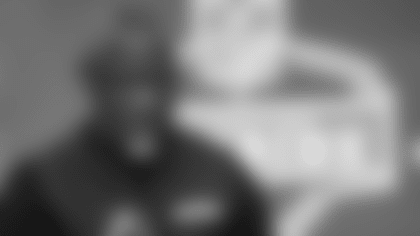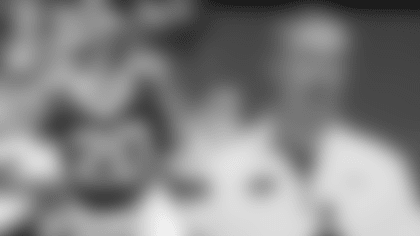*Transcript of head coach Eric Mangini's news conference with the New York Jets media Monday afternoon: *
Our players of the game this week were, offense, Thomas Jones; defense, David Barrett; special teams, Leon Washington, and the practice player of the week, Jason Trusnik. The practice player of the week to me is always the most important award we give out. It's crucial because you have to give the offense and defense the looks so they can get a sense of what they're going to face on Sunday. I thought that Jason did a really good job mimicking Jason Taylor. He actually did an outstanding job. We have had a lot of practice players of the week in the past that have gone on and made the team's active roster: Wallace Wright, Stacy Tutt and Joe Kowalewski. That's always an extremely important award to the team and a very important award to me.
I was pleased with the team in terms of the giveaway/takeaway ratio. We knew that was going to be important. Most games against the Dolphins come down to that. Third down on both sides of the ball was something we talked about quite a bit throughout the week. A lot of that relates to what you do on first and second down. Offensively we did a much better job of not getting into those second-and-long situations, getting into third-and-manageable and then being able to capitalize on those situations.
Defensively it's the same thing. You don't want to let them get too far ahead and get into a bunch of third-and-short situations because those are historically a much higher percentage in terms of success rate. I was pleased with that and with the way the special teams responded. We talked about the return game and how those are momentum plays. You're going to have a kickoff return either at the start of the half or after your opponent scores, and to be able to respond with a long touchdown return after their score is key. That's a big momentum shift there.
We need to continue to improve our kickoff coverage. There are some things I liked and some improvement there, but it's not quite where we need it to be. That's an ongoing process that we'll continue to work on. This week, it's exactly the same as every week, same consistent approach. I talked to the players this morning about Miami and put that to rest from my perspective. The offensive, defensive coordinators and staff will meet as a unit and review some of the plays as a group. Then they'll break it down into positions, review it, move on to Buffalo and we'll start our preparation for the Bills.
On defending screens …
I really like screen passes. That's something we work on extensively throughout the week. We worked on them quite a bit during training camp and the reason they're difficult to defend is they separate the defense. You run the coverage off, let the front come through and now you have a big void with blockers out in front. You have to be sound on that. If the back gets the ball in space, you have to know exactly where you fit in relationship to the other defenders. You have to be able to slip the bigger guys and make a play. Miami last year in the second game, the screen was a big reason why we won — Leon [Washington] hit a long one there at the end to set up the go-ahead field goal. It's a really good answer to pressure and really good way to, as we said, separate the defense, and it's something that you work on consistently.
On specific reads that would indicate when a screen pass was coming …
They were all a little bit different. A couple of them were in the red zone and a couple in the field on first down, one was in the field on second down, so it wasn't a consistent pattern in terms of down or distance or field position. They're different styles of screens. They ran a wide receiver screen and what's called a run-and-shoot screen, which is the line slides, the back blocks the end man on the line of scrimmage, and as soon as the guy that's covering him rushes, he turns around and dumps it to him. There's a classic screen, which the reason it's called classic is because the keys are the same: tackle deep set.
So we got to look at quite a few. You face a lot of different styles each week. Some are off play action where the back will come across the back side, and you have to be able to handle all of them with man [defense] and zone [defense]. And the man and zone answers are different.
On whether the screen passes are exploiting extra pass rushers …
People run screens every single week. It's not unique to us. It's something we do weekly and our opponents do weekly. It's got to be played better. It is a good answer for us. There's a lot of different ways to create the screens. Sometimes you've got a lot of internal pressure, you want to throw it out to a receiver — we call that a tear screen. They were big in college for a while and became big in the NFL. We moved away from those and again the trend comes back. Then if you're getting outside pressure you can go with the inside screen. If you get a team that once you block they bring the defender in coverage, that's a great time for the run-and-shoot screen. So there's a lot of different ways you can attack it.
On whether he expects teams to run screens until the defense can stop them …
Each guy has their own philosophy, and you try to identify the fingerprint of the coordinator. Some people are true copycat coordinators where, if you get beat on a play, they're going to run exactly that same play to see whether you got the problem fixed. Other people will copycat in the sense that they have their playbook and their system, and they'll get the play that's closest to the play you got beat on that's in their system. Like with most issues, if you do expose something, people are going to figure out whether or not you fixed it.
On if there was a defensive letdown when they were up by 18 points …
I think the Dolphins did a really good job, I think Cam [Cameron] does a really good job in those situations. As I said yesterday, that's one of the reasons Brian [Schottenheimer]'s here is because of the problems they create. He's always been very good in the no-huddle procedure and operation, and I thought they made some excellent plays. We've spent a lot of time on two-minute, and it's for the same reason that I expressed to the team today. You saw in the first New England game that there was a two-minute drive at the end of the half. Last week against Baltimore, there was a two-minute drive at the end of the half and we had multiple two-minute drives against Baltimore where we were in position to score 17 points.
You know when you play the Dolphins, or really any team, that you're going to have to deal with that. So many games every week come down to the two-minute situation. We had 10 games last year where we were affected by it, positively and negatively. There'll probably be 10 more games this year. Look at the Philadelphia game in preseason, look at Minnesota at halftime. It's an ongoing process and that's why we spend so much time on it.
On not making plays on defense …
You're always looking to generate as many plays as possible, but as we talked about with turnovers and sacks, that wasn't the focal point. It wasn't about getting a turnover or a sack or getting into that defensive category. It's just about the process and it's about executing the plays that we have called better. Those things come when the process improves and when the execution improves. Not the focus on the end result but the focus on the things that will generate the end result.
On the Dolphins having more than 400 offensive yards …
I've been a part of a lot of defenses that have allowed plenty of yards, and really what you're looking for is points and points against that opponent and making sure you have more than they do at the end of the game.
On containing Miami DE Jason Taylor …
That was a group effort. He's obviously a player that can ruin the game at any point. He's done it time and time again. I thought collectively we did a good job understanding how we needed to approach it. Sometimes Brick [D'Brickashaw Ferguson] was on his own and sometimes he had help. Sometimes the play was designed to stay away from him. There were a lot of people involved in that process.
When Brick did have opportunities to block him on his own, I thought that he did a nice job. Brick has improved steadily and he continues to work on the areas that he has identified he needs improvement in and we've identified that he needs improvement in. He's done some really good things. His situation isn't going to change week in and week out — he's going to face the best pass rusher. It won't get any easier this week. It usually doesn't. It's just focusing on things that he can improve and I saw some of that this week.
On the offensive line …
I've liked the way they've been communicating. I like the way that as a group their level of communication is increasing and improving. That's so important, whether it's offensive line, defensive line or secondary, whatever it is, communication can solve any problem you face. It's better that you're all wrong together than half right or half wrong.
On working on communication during practice …
We work on it all the time. We play music every single day as loud as possible so that it's hard to communicate and you create as tense an environment as you can. Each week someone's going to have to deal with noise, whether it's the offense or the defense. You want them to get used to using hand signals and anticipating adjustments and that's something that I really believe in and we do it every day. The other thing that helps is when they watch tape together and spend time together and can anticipate each other's reactions and how they'll see things.
On the onside kick ruling …
That's something we submit to the league and the league gives us a ruling on. That's something you study. That's one of those plays where it's usually a scrum and you're fighting as hard as you can to get a hold of the ball. You saw it with us in Baltimore. The way that you hit the ball, if you hit it forward it's a penalty and if you hit it backwards it's not. You practice it, but it's hard to simulate those guys screaming down at you, the ball coming, and knowing exactly what angle to bat it out. Those are tough ones to generate at practice.
On RB Leon Washington …
What I really like about Leon is his toughness, his inherent toughness. Early on last year, rookie minicamp and the OTAs, I was relentless with him because the ball was on the ground and there were things he wasn't picking up. He just kept plugging away at it and he got better and better at those things. Each week he carved out a little bit more of an opportunity and we'd put him in in sub and he did well with that. We put him in as a punt returner. I think you remember in the preseason he had some good production there. Kickoff returner, whatever you ask him to do he's done a nice job with. He's played on the kickoff team in the past.
When you look at his college career, he was incredibly productive. I'm pretty sure he was Mr. Florida coming out of high school. It doesn't surprise me that he made progress just based on his approach to the game. I really like the way that he plays big. The way Leon works and the way he improves, he can do a lot of positive things. It's going to take that consistent level of work. Leon's done some really good things on first and second down, too. He's not exclusively a third-down back or a special teams back. He's carved out roles on all four downs.
On Washington's development in Year 2 …
When we drafted Leon, we did a lot of the work on him and we knew how resilient he was and his level of determination. He just needed to make that transition, which he's done. His approach, the way he tries to absorb information from the coaching staff, from Thomas [Jones], Curtis [Martin], whoever it is, you're bound to get better with that type of approach.
On Chris Baker's touchdown reception …
That was a play that had a couple of different options. Chad [Pennington] saw him. He had a nice move at the top of the route, the very top where he was making his break. He did a nice job hinting to the outside and then coming back inside. I thought Chad did a really good job putting the ball in a position where only Chris could make the play. At that point, with seven seconds left, you know you only have one play because a play takes six seconds. He had to get it off quickly and put it into a position where only Chris could make the play because you want to protect the three points. The two of them combined, they brought pressure and the protection had to hold up. I really was happy with that whole drive. I thought that was a nice way to cap the drive.
On Baker …
I've liked the things Chris has done. We've talked a lot about his approach to the off-season. He's done some nice things when he's had the opportunity in the passing game. He does some really good things with the running game and Thomas Jones' production yesterday, that all ties into the offensive line. Chris works at tight end and the receivers work on the perimeter. Chris does a really nice job blocking some guys that are in some cases substantially bigger than he is. He's a stout guy who gets good drive at the line of scrimmage.
On if Baker is developing a reputation for making the big play …
I'm not sure what his reputation is. I know he's made some very good plays for us and not just touchdown passes — the play he had against Tennessee last year in the opener and really the catch that wasn't a catch against Cleveland last year. There's been some difficult balls that he's come down with, and that comes back to concentration and really how well you're able to run the route and how well you're able to separate from the defender. He continues to improve there.
On whether he wants to get Baker more involved in the passing game ...
You're always working to get each guy involved in the offensive plan. Yesterday you saw a lot of that where Leon got involved in a couple of different ways, Brad Smith got involved, Jerricho [Cotchery], LC [Laveranues Coles], Justin McCareins, Thomas and Chris. The key thing for us is that you know that each guy has an opportunity to make a play. Chad trusts that and Chad's trusting that they get to the right spot. The key thing for Chad to do is go back and make the correct read and put the guys in the position where they can get the football.
On whether he occasionally wishes Washington had been more involved in the offense after watching video of a particular game …
You always have the opportunity to second-guess after you watch the tape. What we're really looking at is how can you use the players in the most effective way. Sometimes this week was less about big personnel, 21-12 [two RBs, one TE or one RB, two TEs]. There were more multiple wide receiver sets, so that changes things.
You saw the way the game changed based on time of possession in the first half versus the second half, an amount of opportunities the offense had in the second half where you could have more carries, things like that. Some of that is dictated by how you're going to play and how you expect them to match you and how they do actually match you. Then how the time of possession goes and how many opportunities your offense has.
There's a lot factors that play into that stuff and you can go in with one plan and have to completely adjust it based on the way the game is going. Are you out in front? Behind? Is it close? Can you stick with the game plan? Are they matching you the way you thought? Are they playing the front? Is there heavier pressure than you expected? What's their philosophy going in?
On plays made by QB Chad Pennington that don't show up in the box score …
There were several of them. He was able to draw them offsides three different times. The play on third-and-2 where he ran up to the line of scrimmage and was able to snap the ball when they had 12 men on the field — that's a first down without running a play. The awareness of how many guys are on the field. You can't ask for a better play than that, where you run up, snap it, catch them, and you have a first down in the red zone.
Even something like it's third-and-12 and [playclock] time is running out in the third quarter and not calling the timeout. It's third-and-12 and the percentage of making that third down is not very high. It's probably not significantly different than third-and-17. We did convert on that one, but whether it was to third-and-12 or third-and-17, it would have been a conversion. Those timeouts are extremely valuable and to use them at that point, it's not really a good use of your resources. I thought he made an excellent decision there.














